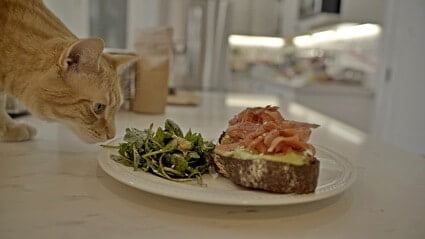Unlike some animals, cats are believed to be safe when left alone with human food, but this isn’t the case. Cats are inquisitive animals that may eat something only intended for human consumption.
Toxic foods for cats include grapes and raisins, caffeine, alcohol, chocolate, avocado, and excessive tuna fish. Cats are usually lactose intolerant and shouldn’t consume dairy products, such as milk, cream, and cheese. In addition, avoid feeding your cat raw meat and fish due to the risk of bacterial poisoning.
Keep cats away from human food as they won’t miss what they have never experienced. However, if your cat has developed a taste for it, you need to find out which ingredients are harmful or even dangerous.
Can Cats Eat Human Food?
Cats have a limited number of taste buds. This does not mean that they are immune to the appeal of human foods. Cats are natural imitators and may see you eating something and assume that it should be joining you.
In addition, cats are territorial. A cat operates a simple philosophy: “what’s mine is mine, and what’s yours is mine, too.” This can extend to food consumption. So, cats may steal human food from your plate or a communal area when you’re out of the room of not paying attention.
Cats have delicate stomachs, and many human foods disagree with feline digestion. If your cat eats the same dinner as you, it may start to feel unwell. Of course, some foodstuffs are undeniably more harmful than others.
What Foods are Cats Not Allowed To Eat?
In an ideal world, cats would only eat cat food. There is nothing to gain by letting your cat develop a taste for human food, but it happens all the time. Any food can be potentially harmful to cats due to unknown toxic ingredients. Sometimes those dangerous ingredients are added by manufacturers, and sometimes they occur naturally.
Also, cats can sometimes develop an allergic reaction to human foods, so it’s important to know the signs:
- Vomiting and diarrhea
- Gas and flatulence
- Skin irritation (scratching, outbreaks of hives, and red patches)
- Coughing and sneezing
- Shortness of breath
If your cat is prone to eating human food, you need to know what is toxic and dangerous. Here are some foodstuffs that cats should be kept far away from:
Dairy
Cats sometimes enjoy milk and cream because they’re high in fat. But, unfortunately, drinking milk or eating cheese can lead to gas, bloating, and stomach upsets. As per the Australian Veterinary Journal, the feline body cannot digest lactose. Instead, it remains in the digestive tract until purged through feces.
Chocolate
Chocolate can be deadly for cats due to the presence of an alkaloid called theobromine. As per the Journal of Small Animal Practice, this alkaloid can potentially lead to heart failure.
Theobromine is found in pure cacao. This means that the darker a chocolate, the more dangerous it is to cats. Pure cooking chocolate, for example, could kill a cat in a matter of hours. White chocolate, while still harmful, is less toxic.
Garlic And Onions
Many human foods have added onion and garlic for flavor. However, whether cooked or raw, they’re both toxic to cats. The Journal of Agricultural and Food Chemistry explains that this is because onions and garlic cause anemia in cats.
Anemia occurs due to a low red blood cell count, so a cat will struggle to take in oxygen. As a result, an anemic cat may find it hard to breathe, becoming lethargic and drowsy. It may also, in part, reduce a cat’s immunity to viruses.
Grapes, Currants, And Raisins
Experts are unsure why grapes and raisins are so harmful to cats. Some scientists believe it is due to the presence of tannin in grapes. Others claim that the skin of the fruit contains toxins. Unfortunately, their consumption is correlated to reduced kidney function and even acute kidney failure in cats.
Raw Meat
Some owners feed their cats a raw meat diet, which appeals to a cat’s basic instincts. Comparative Biochemistry and Physiology confirms that cats are obligate carnivores, and raw meat mimics a feline’s wild diet.
A raw diet is inadvisable due to the presence of harmful bacteria. So, a cat that eats raw meat faces an elevated risk of salmonella or toxoplasmosis. Staphylococcus aureus (staph infection) is also a possibility.
You could also be feeding your cat spoiled meat. Raw meat can go off quickly, especially in warmer climates. This will lead to more than stomach rumbling and strange noises. Also, bones pose a choking hazard.

Raw Fish or Seafood
Many cats love eating fish, but raw fish contains thiaminase. This is an enzyme that destroys thiamine (vitamin B1) in a cat’s body. Vitamin B1 metabolizes carbohydrates, so it’s critical for organ function.
As per Experimental Brain Research, thiamine deficiency is linked to significant neurological issues in cats. Cats with this issue may experience an uncoordinated gait, loss of motor function, seizures, and convulsions.
Raw fish contains bacteria. If a cat is to eat fish, it must be thoroughly cooked and deboned.
Raw Dough
If you have ever baked your own bread, you will notice that dough rises in heat. If a cat eats raw dough, it will continue to rise in the stomach, placing pressure on the abdomen. Raw dough can also cause intestinal blockages. This can prevent a cat from digesting food or going to the toilet.
As the yeast found in dough ferments, it releases alcohol, which is also dangerous to cats. A feline that eats dough may even experience alcohol poisoning.
Raw Eggs
As eggs fall under the category of dairy, many owners will avoid them by default. However, cooked eggs can be healthy for cats. For example, cooked scrambled eggs are a rich source of lean protein.
Raw eggs can contain salmonella and E.coli. Also, raw egg whites contain avidin, an enzyme that prevents a cat’s body from acquiring biotin (vitamin B7). This vitamin is essential to keep a cat’s coat glossy.
Orange (Peel And Pips)
The orange itself is OK, provided that the pips (seeds) and peel are completely removed. Orange peels contain essential oils (limonene and linalool.) These are toxic and will cause citrus poisoning.
Unlike humans, the feline body creates vitamin C organically. An excess vitamin C will be excreted as oxalate, but the metabolization process can lead to calcium oxalate stones in the bladder and kidneys.
Liver
Liver, especially chicken liver, is good food for cats. It’s high in vitamin A, which aids feline vision, gives a cat a glossy coat, and strengthens the muscles. Unfortunately, too much liver can lead to vitamin A poisoning.
As per the Canadian Veterinary Journal, Vitamin A toxicity can lead to hyperesthesia, which results in an excessive sensitivity to light, sound, or scent. This will make a cat skittish and nervous.
Vitamin A poisoning impacts a cat’s bones and causes sore muscles. In extreme cases, a cat’s bones can even grow misshapen, causing permanent damage. As with all feline feeding, moderation is critical.
Tuna
Many experts recommend feeding cats tuna as a treat. It can tempt cats out of hiding, and the juice can encourage cats to drink or eat other foods. However, if you offer your cat tuna, do so in small, controlled servings.
Tuna can be dangerous in high quantities due to the presence of mercury. As Veterinary and Human Toxicology explains, mercury poisoning can lead to glomerulonephropathy or nephrotic syndrome, which are kidney diseases.
Albacore tuna contains 3 times more mercury than traditional tinned tunas, so mercury poisoning is far more likely. Feed your cat a chunk-light tuna that is packed in water. Oils and sauces can be harmful or lead to weight gain.
Green or Unripe Tomatoes
Plump, ripe, red tomatoes are safe for cats to eat. In fact, they are healthy. This is why some commercial cat foods contain tomatoes. The important thing to note is ripeness because green tomatoes are deadly to cats.
Immature tomatoes contain a compound called solanine. This means that green tomatoes are part of the same family as belladonna or deadly nightshade. A cat that consumes solanine and goes untreated may die within 36 hours.
Avocado or Guacamole
In moderation, the meat of an avocado can be safely consumed by cats. Unfortunately, the leaves, pit, and skin contain a toxin to many animals called persin. While safe for human consumption, persin can be toxic to cats, leading to gastrointestinal upset. The pits of avocados also represent a choking hazard.
Cats should never be fed guacamole (a dip made from avocados and other ingredients) as the fat and persin content is much higher. In addition, the dip will contain spicy onions, jalapeno pepper, and garlic for flavor.
Xylitol (Sweetener)
The Journal of Veterinary Pharmacology and Therapeutics has said that xylitol isn’t toxic to cats. Despite this, xylitol shouldn’t be given to cats. Cats cannot taste sweetness, so it is redundant as a flavor enhancement.
In addition, xylitol can affect a cat’s insulin levels. Xylitol tricks the feline body into thinking it has consumed sugar. This will lead to the enhanced release of insulin. This, in turn, can lead to feline hypoglycemia (low blood sugar).
Caffeine (Coffee, Soda Drinks)
Guard your morning coffee and do not allow a cat to drink soda. Equally, be sure to clean up any spillages immediately. Cats are sensitive to the impact of caffeine, and small doses can be toxic. Cats will also experience immediate, severe spikes in heart rate and anxiety.
The main issue is theobromine, which is the same chemical that makes chocolate dangerous. Also, as per the Canadian Journal of Physiology and Pharmacology, caffeine consumption can cause stomach ulcers in cats.
Alcohol
Never allow your cat to drink wine, beer, or spirits because they cause ethanol toxicosis. Mouthwash, certain cleaning products, and perfume may be infused with alcohol, so they should also be kept away from cats.
Alcohol consumption can lead to kidney failure, respiratory problems, liver failure, unconsciousness, cardiac arrest, or sudden death. The health of the cat, coupled with the level of consumption, will determine how your cat reacts.

Bones
Bones can be a health hazard for cats. They may contain shreds of raw meat that cause bacterial infection, a tough bone may break a cat’s teeth, and a brittle bone may splinter, becoming a choking hazard. Instead of bones, provide your cat with feline-friendly chew toys infused with catnip.
How To Keep Cats Away from Human Food
Cats can be curious and determined, so you’ll need to keep your cat away from harmful human foods. Here’s how:
Safe Storage
Ensure that anything harmful is kept out of a cat’s reach. Felines are curious animals and will likely investigate anything they encounter. Keep your garlic, onions and raw meat chilled in your fridge.
Keep items like xylitol, alcohol, and coffee in a cupboard. While not a foodstuff, do the same with medications. As per the Journal of Veterinary Emergency and Critical Care, aspirin and ibuprofen are dangerous to cats.
Separate Feeding
Your cat should eat its meal in a separate room before you eat. Ideally, feed your cat around an hour before you eat. This teaches the cat to differentiate between its own food and that of humans.
No Table Scraps
If you offer your cat human food while eating, it will always expect to share your meal. This can lead to a range of behavioral issues. The cat may grow aggressive and agitated at not being fed scraps.
Clean Up After Yourself
Never leave any unfinished meals on the table after eating. Food waste should be moved to a secure trash can and all dishes washed. Otherwise, the cat will leap onto a kitchen table or work surface and begin eating human foods.
Owners love to feed their cats different food types, and cats will be curious about what you’re eating. The problem is that it sets a precedent, and many human foods are toxic to cats. Cats obligate carnivores, and their bodies function differently from ours, so it’s better to feed them meals intended for feline consumption.

